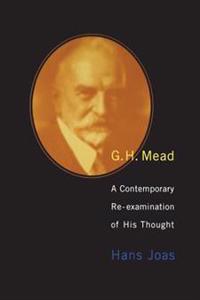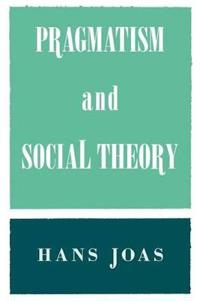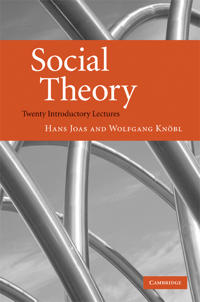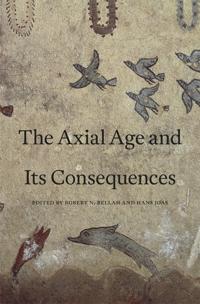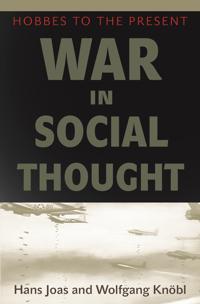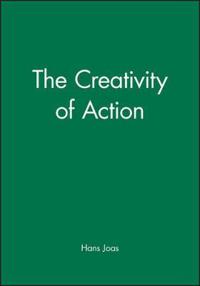G.H. Mead (Pocket)
avHans Joas, Raymond (TRN) Meyer, Hans Joas
ISBN: 9780262600293 - UTGIVEN: 1997-08The work of American pragmatist George Herbert Mead (1863-1931) had a strong influence in fields ranging from metaphysics and ethics to sociology and social psychology. In this book, the author interweaves Mead's political and intellectual biography with the development of his theories.[...]
The Genesis of Values (Häftad)
avHans Joas
ISBN: 9780226400402 - UTGIVEN: 200104Public and intellectual debates have long struggled with the concept of values and the difficulties of defining them. With "The Genesis of Values, renowned theorist Hans Joas explores the nature of these difficulties in relation to some of the leading figures of twentieth-century philosophy and soci[...]
Pragmatism and Social Theory (Häftad)
avHans Joas
ISBN: 9780226400426 - UTGIVEN: 199301Rising concerns among scholars about the intellectual and cultural foundations of democracy have led to a revival of interest in the American philosophical tradition of pragmatism. In this book, Hans Joas shows how pragmatism can link divergent intellectual efforts to understand the social contexts [...]
Social Theory (Häftad)
avHans Joas, Wolfgang Knobl
ISBN: 9780521690881 - UTGIVEN: 200907Social theory is the theoretical core of the social sciences, clearly distinguishable from political theory and cultural analysis. This 2009 book offers a unique overview of the development of social theory from the end of the Second World War in 1945 to the present day. Spanning the literature in E[...]
The Axial Age and Its Consequences (Inbunden)
avRobert N. Bellah, Hans Joas, Robert N. Bellah
ISBN: 9780674066496 - UTGIVEN: 201210The first classics in human history--the early works of literature, philosophy, and theology to which we have returned throughout the ages--appeared in the middle centuries of the first millennium bce. The canonical texts of the Hebrew scriptures, the philosophical writings of Plato and Aristotle, t[...]
War in Social Thought (Inbunden)
avHans Joas, Wolfgang Knobl
ISBN: 9780691150840 - UTGIVEN: 201210This book, the first of its kind, provides a sweeping critical history of social theories about war and peace from Hobbes to the present. Distinguished social theorists Hans Joas and Wolfgang Knobl present both a broad intellectual history and an original argument as they trace the development of th[...]
Creativity of action (Pocket)
avHans Joas
ISBN: 9780745617718 - UTGIVEN: 199610This work outlines the fundamentals of a new theory of action, drawing on philosophical pragmatism. It is based upon the author's study of G.H. Mead, but also establishes direct ties between Mead's work and approaches drawn from German traditions of philosophical anthropology.[...]
The Genesis of Values (Häftad)
avHans Joas
ISBN: 9780745621548 - UTGIVEN: 200010One of the most important issues in public and academic debate is the concept of value and the difficulty in defining it. In this new book, the leading social theorist Hans Joas explores the nature of values in relation to some of the leading figures of twentieth--century philosophy and social theor[...]
War and Modernity (Häftad)
avHans Joas
ISBN: 9780745626451 - UTGIVEN: 200212Written by one of Europea s leading social theorists, this book takes up the claims of modernity and confronts them with a stark reality: the ongoing proliferation of war. How can contemporary social and political thought come to terms with this apparent failure of modernity? Throughout the 20th cen[...]
Faith as an Option (Häftad)
avHans Joas
ISBN: 9780804792776 - UTGIVEN: 2014-10Many people these days regard religion as outdated and are unable to understand how believers can intellectually justify their faith. Nonbelievers have long assumed that progress in technology and the sciences renders religion irrelevant. Believers, in contrast, see religion as vital to society's sp[...]
The Sacredness of the Person (Häftad)
avHans Joas
ISBN: 9781589019690 - UTGIVEN: 201302What are the origins of the idea of human rights and universal human dignity? How can we most fully understand -- and realize -- these rights going into the future? In The Sacredness of the Person, internationally renowned sociologist and social theorist Hans Joas tells a story that differs from co[...]
Do We Need Religion? (Häftad)
avHans Joas
ISBN: 9781594514395 - UTGIVEN: 200802The old assumption that modernization leads to secularization is outdated. Yet the certainty that religion is an anthropological universal that can only be suppressed by governments is also dead. Thus it is now a favorable moment for a new perspective on religion. This book takes human experiences o[...]
Braucht der Mensch Religion? (Pocket)
avHans Joas
ISBN: 9783451054594 - UTGIVEN: 2004-08Was erfährt, wer glaubt? Die Erfahrung der Selbstüberschreitung braucht Deutung. Eine überraschende Sicht auf eine alte Menschheitsfrage.[...]
Tro som alternativ. Kristendomens framtidsutsikter (Häftad med flikar)
avHans Joas
ISBN: 9789171734587 - UTGIVEN: 2015-09-25

